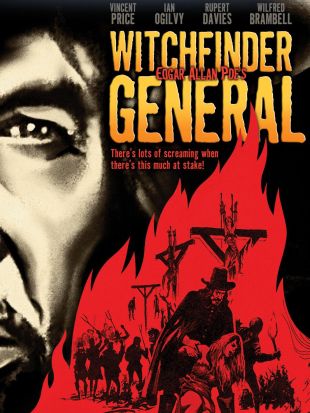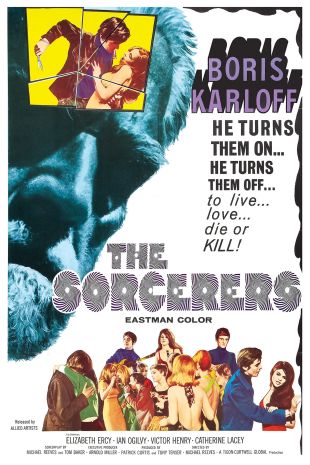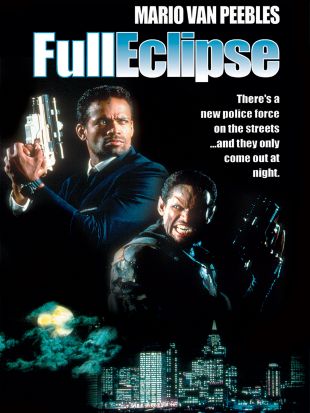Michael Reeves is one of the great, tragically lost figures in the history of cinema -- a prodigious talent undone by personal demons and also, perhaps, the times in which he lived. Variously described by the people who knew and worked with him as a potential rival to Steven Spielberg, an Orson Welles in the making, Reeves only completed three full-length movies in his career.
Born in 1943 to the poor side of a wealthy British name, Reeves was raised by his mother. He grew up spellbound by cinema, and was especially drawn to American movies of all genres: westerns, thrillers, horror, and science fiction. As early as age eight, he declared his dream to become a film director. Reeves made his first fully plotted movie -- a 20-minute thriller called Carrie, about a disabled girl being stalked -- when he was 15. He learned to mimick the movements of the camera as he'd seen in Hollywood movies using his mother's tea-trolley; from watching movies closely, he also knew where to place his camera in order to get the kinds of shots he wanted. Reeves wrote, produced, directed, and starred in Carrie, playing the hero. While planning the production for this film, he was introduced to another teenager, aspiring actor (and future film star) Ian Ogilvy, who portrayed the villain and became Reeves' his lifelong friend. The movie wasn't a significant piece, except as a first credit to Ogilvy's name and as a sample of Reeves' potential. The same year he made Carrie, Reeves' personal situation changed radically when his mother suddenly came into the family's money, and he found himself free to pursue any goal he chose. He ran off to Hollywood in 1961 at age 17, in search of his favorite filmmaker, Don Siegel. So the story goes -- he got Siegel's address, rang his bell one morning, and introduced himself to the bewildered director as having come all the way from England to meet him. Siegel then hired Reeves as a gopher and junior production assistant, at first, and it was while working for the veteran director that he began honing his own skills and instincts as a filmmaker.
Reeves became an assistant director and was hired to work on The Long Ships (1963), an adventure film starring Richard Widmark and Sidney Poitier, on which he spent a month doing pre-production and another month on production. The movie's producer, Paul Maslansky, was so impressed with Reeves that he got him a job directing the second unit material on Castle of the Living Dead (1963). Reeves didn't last long on the set of that movie, however, leaving the production sooner than anticipated because of a new opportunity: he had been given the funding, the cast, and the opportunity to make Revenge of the Blood Beast (1966) (U.S. title, The She-Beast), starring Ian Ogilvy and John Karlsen. The sheer audacity of this 19-year-old convinced Maslansky to follow Reeves into the movie as its producer. Maslansky was also responsible for getting Barbara Steele into the film. Shot in Italy and Yugoslavia, Revenge of the Blood Beast offered a strange mix of horror, gore, and comedy that managed to put it onto the horror circuit. Suddenly, Reeves not only had his first directorial credit, but the beginning of a cult following, similar to what Roger Corman began achieving at the other end of the '60s with his Edgar Allen Poe adaptations. Revenge of the Blood Beast was enough of a success to get Reeves a better budget his next time out with The Sorcerers (1967), a mix of swinging London ambience and science fiction horror. The Sorcerers was a cyber horror analogue to Antonioni's Blow-Up, and anticipated aspects of Douglas Trumbull's ill-fated Brainstorm, among others. It benefited heavily from the presence of Boris Karloff as one of the leads (along with Ogilvy and Catherine Lacey) and from its visceral connection to its setting, the London clubs, where many of its key scenes took place. This connection could only have been achieved by a filmmaker of Reeves' youth. Indeed, parts of The Sorcerers play like a classic rock & roll movie of the era. For Reeves, The Sorcerers also marked his first collaboration with producer Tony Tenser, who was thrilled with the 22-year-old's ability to put together good material in a hurry, on or under budget. The movie was a hit, and it paved the way for what would prove to be Reeves' crowning achievement, Witchfinder General (1968) (U.S. title, The Conqueror Worm). The film involved a set of galleys during the vicious conflagration that swept the U.K. during the English civil war in the 17th century, when the Roundheads deposed and executed King Charles I. Even with Reeves helming the movie, it was too expensive for Tenser's Tigon Productions to film alone, so Tenser reached out to American International Pictures in the United States, who liked the potential of the story and were able to provide the services of the international star, Vincent Price. Reeves and director Roger Corman were able to convince Price, who had been overacting for years, to shed his most pronounced mannerisms and give the most understated performance of his career thus far. Reeves shot Witchfinder General on location under very spartan conditions. He ended up creating a very eerie and unsettling movie, marked by extreme violence. It was his intention to make a movie that would leave audiences spellbound and stunned, in a manner similar to the effect achieved by Sam Peckinpah in The Wild Bunch and Stanley Kubrick in A Clockwork Orange. There was a complexity behind Reeves' movie that few commercial movies ever even attempted to achieve. Witchfinder General was a hit, albeit a controversial one in England where it was heavily scrutinized ahead of its release and was attacked by many mainstream critics, who found even the cut version very disturbing.
In the wake of Witchfinder General, it seemed as though Reeves had the world at his feet; However, it was at this point that his life began to unravel for reasons no one seemed to fully understand. He became increasingly withdrawn from his friends; those who tried to stay close to him got the impression that he was depressed about his career. Reeves dwelled increasingly in this state, possibly suffering from insomnia, and finally one night he took an overdose of sleeping pills while drunk. He died in his sleep during the winter of 1969, and his passing was officially listed as a suicide and called an "accident" by others around him. In the decades since, his enigmatic image and tiny oeuvre have only added to the mystique and mystery surrounding this short-lived filmmaker. Witchfinder General, reissued in both its American and British versions on each side of the Atlantic, still attracts new generations of fans; The Sorcerers and Revenge of the Blood Beast have also begun acquiring respect in the decades since Reeves' death.


